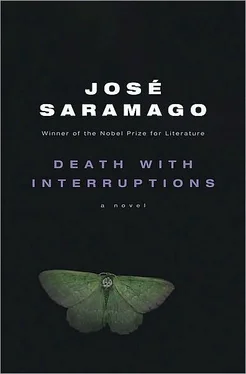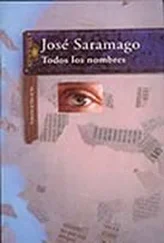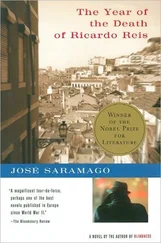Now it's a matter of finding a hotel not too far from the musician's house. Death strolled down into the center, went into a travel agency, asked if she could study a map of the city, on which she quickly located the theater, and from there her index finger traveled across the map to the area where the cellist lived. It was a little out of the way, but there were hotels nearby. The assistant recommended one of them, not luxurious, but comfortable. He himself offered to make the reservation over the phone, and when death asked him how much she owed him for his efforts, he replied, smiling, Just put it on my account. What could be more normal, people say things without thinking, they utter words at random and it doesn't even occur to them to consider the consequences, Put it on my account, said the man, doubtless imagining, with incorrigible masculine vanity, some pleasurable encounter in the near future. He risked death replying with a cold eye, Be careful, you don't know who you're talking to, but she merely gave a vague smile, thanked him and set off without leaving a phone number or a visiting card. In the air hung a diffuse perfume, a mixture of rose and chrysanthemum, Yes, that's what it smells like, half rose and half chrysanthemum, murmured the assistant, while he slowly folded up the city map. Out in the street, death was hailing a taxi and giving the driver the address of the hotel. She didn't feel at all pleased with herself. She had frightened the kindly lady in the box office, she'd had fun at her expense, and that's an unforgivable thing to do. People are quite terrified enough of death without her appearing before them with a smile and saying, Hi, it's me, the latest version, the familiar version if you like, of that ominous latin tag memento, homo, quia pulvis es et in pulverem re-verteris, and then, as if that weren't enough, she had been about to skewer another extremely nice, helpful person with the stupid question that the so-called upper classes have the barefaced cheek to ask of those beneath them, Do you know who you're talking to. No, death is not pleased with her own behavior. She is sure that in her skeletal form she would never have behaved like that, Perhaps it's because I've taken on human form, she thought, these things are catching. She glanced out of the window and recognized the street they were driving along, this is the cellist's street and that's the ground-floor apartment where he lives. Death seemed to feel a tightening in her solar plexus, a sudden agitation of the nerves, like the shiver that goes through a hunter when he spies his prey, when he has it within his sights, it could be a kind of obscure fear, as if she were beginning to feel afraid of herself. The taxi stopped, This is the hotel, said the driver. Death paid him with the change that the woman at the theater had given her, The rest is for you, she said, not even noticing that the rest was more than the amount on the taxi meter. She had an excuse, this is the first time she has used the services of this form of public transport.
As she went over to the reception desk, she remembered that the man at the travel agency hadn't asked her name, he had simply said to the hotel, I'm sending you a customer, yes, a customer, right now, and there she was, this customer who could not possibly say that her name was death, with a small d, please, or that she didn't know what name to give, ah, her bag, the bag over her shoulder, the bag out of which came the dark glasses and the money, the bag out of which must surely come some identifying document, Good afternoon, may I help you, asked the receptionist, A travel agency phoned a quarter of an hour ago to make a reservation for me, Yes, madam, I was the one who took the call, Well, here I am, Would you mind filling out this form, please. Death knows what her name is now, she found it on the identity card that lies open on the desk, and thanks to her dark glasses she will be able to copy down the facts discreetly, name, place of birth, nationality, marital status, profession, without the receptionist realizing, Here you are, she said, How long will you be staying at the hotel, Until next monday, May I make a photocopy of your credit card, Oh, I didn't bring it with me, but I can pay now, in advance, if you like, No, no, that won't be necessary, said the receptionist. She took the identity card to cross-check the information on the form and, with a puzzled expression on her face, glanced up. The photo on the document was that of a much older woman. Death took off her dark glasses and smiled. Confused, the receptionist looked again at the document, the photo and the woman before her were now as alike as two peas in a pod. Do you have any luggage, she asked, drawing one hand across her perspiring brow, No, I came to town to do some shopping, replied death.
She stayed in her room all day, taking both lunch and supper in the hotel. She watched television until late. Then she got into bed and turned out the light. She didn't sleep. Death never sleeps.
WEARING THE NEW DRESS THAT SHE BOUGHT YESTERDAY IN a shop downtown, death goes to the concert. She is sitting alone in the box, and, just as she did during the rehearsal, she is looking at the cellist. Just before the lights went down, when the orchestra was waiting for the conductor to come, he noticed her. He wasn't the only musician to do so. Firstly, because she was alone in the box, which although not rare, wasn't that frequent an occurrence either. Secondly, because she was pretty, possibly not the prettiest woman in the audience, but pretty in a very particular, indefinable way that couldn't be put into words, like a line of poetry whose ultimate meaning, if such a thing exists in a line of poetry, continually escapes the translator. And finally, because her lone figure, there in the box, surrounded by emptiness and absence on every side, as if she inhabited a void, seemed to be the expression of the most absolute solitude. Death, who had smiled so often and so dangerously since she emerged from her icy subterranean room, is not smiling now. The men in the audience observe her with ambiguous curiosity, the women with keen disquiet, but she, like an eagle diving through the air toward a lamb, has eyes only for the cellist. With one difference, though. In the gaze of this other eagle who has always caught her victims there is something like a tenuous veil of pity, eagles, as we know, are obliged to kill, that is their nature, but this eagle here, now, would perhaps prefer, faced by the defenseless lamb, to open her powerful wings and fly back up into the sky, into the cold air of space, into the untouchable flocks of the clouds. The orchestra has fallen silent. The cellist starts to play his solo as if he had been born for that alone. He doesn't know that the woman in the box has in her brand-new handbag a violet-colored letter addressed to him, he doesn't know, how could he, and yet he plays as if he were bidding farewell to the world, as if he were at last saying everything that he had always kept unsaid, the truncated dreams, the frustrated yearnings, in short, life. The other musicians stare at him in amazement, the conductor with surprise and respect, the audience sighs, a shudder runs through them, and the veil of pity that clouded the sharp gaze of the eagle is now a veil of tears. The solo is over, the orchestra washed over the cello's song like a great, slow sea, gently submerging it, absorbing and amplifying that song as if to lead it into a place where music was transmuted into silence, into the merest shadow of a vibration that touched the skin like the final, inaudible murmur of a kettledrum on which a passing butterfly had momentarily alighted. The silken, malevolent flight of acherontia atropos fluttered quickly through death's memory, but she brushed it away with a wave of her hand which could as easily have been the gesture that made the letters disappear from the desk in her subterranean room as it could a gesture of thanks to the cellist, who was now turning his head in her direction, his eyes seeking a path through the warm darkness of the theater. Death repeated the gesture and it was as if her slender fingers had perched for a moment on the hand moving the bow. However, even though his heart had done everything to make the cellist miss a note, he did not. Her fingers would not touch him again, death had realized that one must never distract an artist while he is practicing his art. When the concert was over and the audience burst into loud cheering, when the lights went up and the conductor brought the orchestra to their feet, and then indicated to the cellist that he alone should get up in order to receive his much-deserved quota of the applause, death, standing, smiling at last, pressed her hands to her breast, in silence, and just looked, that's all, let the others clap, let the others cry bravo, let the others call the conductor back ten times, she just looked. Then, slowly, as if reluctantly, the audience began to leave, at the same time as the orchestra was packing up. When the cellist turned toward the box, she, the woman, was no longer there. Ah, well, that's life, he murmured.
Читать дальше












